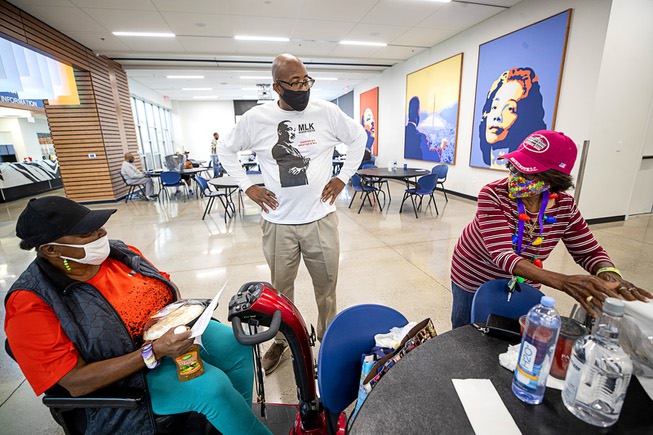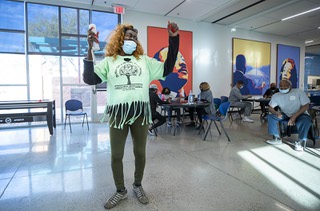
Byron Goynes, program director, talks with Dora Jackson, left, and Caseal Reed at the Martin Luther King Senior Center in North Las Vegas Thursday, Dec. 2, 2021. “We see the need is there, and as our seniors call and have a need, we’re just happy we’re able to fill it for them,” Goynes said.
Wednesday, Dec. 8, 2021 | 2 a.m.
One afternoon in the Martin Luther King Senior Center in North Las Vegas, a group of senior citizens was engaged in a competitive game of Nintendo Wii bowling.
The newly opened recreation room was filled with other mingling seniors, including Dora Jackson and Caseal Reed, longtime friends who have spent their days at the center for the past 20 years. They accepted containers of sugar-free pie from the center's head chef — and Jackson, who is diabetic, cheered excitedly for the dessert.
It has been just months since the MLK center reopened, and the seniors, huddled around circular tables or swiping the air holding a Wii remote, are delighted to return, the sunlit recreation room a new point of connection after being apart for so long.
The pandemic forced the closure of the center from March 2020 — when the Centers for Disease Control and Prevention advised those ages 60 and older to avoid high-density activities — to September.
That advisory thrust older adults into isolation away from their longtime senior center peers, many of whom had become like family. Jackson and Reed called each other every day on the phone, but it wasn’t the same as an in-person interaction.
“I can tell her anything, and I know it’s not going to go anywhere,” Jackson said of her friend. “She’s the only one out here that I talk to like that.”
The center has about 3,000 registered members, 400 of whom are active with the center, said program director Byron Goynes.
Those who returned must provide COVID vaccination proof and wear a mask. For those who haven’t returned, UNR students volunteer to work the phones to check in with seniors, a strategy the center employed during the pandemic.
“When the pandemic first hit, we saw a decline in their overall attitude,” Goynes said. “There was a little bit of isolation, especially those seniors that lived alone. The only access they had was via the telephone, and so about six-and-a-half-months into that, we were aggressively making sure that we call them on a weekly basis.”
About one in five older adults experiences depression, anxiety, insomnia or other mental health disorders, an aspect of seniors’ well-being that was exacerbated by the COVID-19 pandemic, according to May poll by the University of Michigan.
Among adults 50–80 years old, 28% had worse anxiety or worry, 19% had poorer sleep and 19% had worse depression or sadness. In the past two years, 19% of adults expressed concern over their mental health to their health care provider, and 10% met with a mental health professional.
Although her family is sprawled across North Carolina, Maryland, New York and New Jersey, Jackson has lived in Las Vegas since 1983. In addition to her phone calls with Reed, she said she speaks on the phone weekly with a UNR student, several of whom volunteer for phone call outreach to the seniors.
These calls are another tradition Jackson has upheld throughout her years at the center, she said, and kept her from feeling lonely.
Jackson described Reed as a sister for their close-knit and lasting friendship that persisted while they were situated at home. Even now — as Jackson uses an electric mobility scooter to maneuver around while in recovery from a fractured tailbone — Reed transports groceries, provided by the center and Three Square, to Jackson’s apartment.
Three Square is a Southern Nevada food bank and meal distribution nonprofit that Goynes said was instrumental in providing fresh, healthy groceries to residents while the center was closed. The food bank does food rescues or receives food otherwise thrown away from supermarkets, as well as obtains food from the federal government and individual donations.
On the first Friday of every month, the center serves about 150 seniors at a drive-thru food giveaway, equipping them and, if needed, the rest of their household with a week’s worth of food. The center also did food delivery to seniors when it was closed. Growing up the eldest of eight daughters, Jackson said she now enjoys cooking for herself — bacon, grits and eggs, occasionally with coffee, is her preferred breakfast — using food from the center.
Goynes said that during the pandemic, food insecurity among the seniors became more prevalent.
The center serves primarily Black residents, Goynes said. A combined threat of COVID-19, which kills and hospitalizes Black Americans at higher rates, and food insecurity further cemented the necessity of the center, he said.
In the future, Goynes said the center will renew activities — beyond the mingling and friendly Wii Sports sessions — it hosted before the pandemic hit. Classes like jewelry making will attract seniors like Jackson, who on Thursday wore dangling, lime green earrings she said she made at the center.
“We see the need is there, and as our seniors call and have a need, we’re just happy we’re able to fill it for them,” Goynes said.
In Henderson, the Heritage Senior Center also hinged its outreach efforts on food. Corey Clark, Parks and Recreation manager for Henderson, said the center served 200 to 400 seniors — depending on the afternoon’s menu — in its dining room, windows of which are covered by illustrated, Christmas-themed images of Snoopy and Charlie Brown.
It also partners with Three Square and Dignity Health Helping Hands to offer grocery delivery directly to seniors’ homes.
Beyond food, Heritage staff called active members on the phone and sent them cards while the center was closed, the latter of which received immensely positive feedback, Clark said. Additionally, Heritage hosted a “Jingle All the Way” Christmas drive-thru last year, where seniors sat in their cars from the entrance to the facility on South Racetrack Road to the neighboring Heritage Park and gave out pandemic goodie bags with items like N95 masks.
“It was such a good vibe, me and the staff walking down to the car, [saying], ‘We’ve missed you guys,” he said. “We had seniors driving through that were crying because they were so happy to be back. … It’s family here.”
Masks are required in all areas of the center except when seniors are eating, Clark said. The center does not require residents be vaccinated against COVID-19, though Clark said he anticipates the center’s vaccine rate is in line with the county’s.
Alongside its popular lunchtime, the center boasts a library, fitness center and game room, where billiards and puzzles are popular. Clark said he believed the center had returned to its full capacity — and, in some cases, surpassed pre-pandemic participation.
“It’s not just that the seniors had a social distance,” he said. "The seniors really had a stay-at-home order. … We were waiting until the health authorities said, ‘It’s OK. It’s time for seniors to come back.’ As much as that was hard, so hard for us to do … safety was paramount for these folks.”
The MLK center hosted a vaccine clinic Dec. 2–3 in partnership with the Southern Nevada Health District and the North Las Vegas Fire Department. EMS fire chief Frank Simone said the department offered 100 first or booster doses. In Las Vegas, other Black leaders are spearheading efforts to motivate vaccine-hesitant Black residents in their own communities.
Senior centers like MLK, Simone said, are opportune locations for vaccine clinics because they grant increased accessibility granted to a vulnerable population that may have limited mobility or transportation.
“[MLK] seems to be a center point for a lot of the community,” he said. “The community centers attract, as you can see, a large wealth of individuals."
Clark said the Heritage Senior Center also organized a six-week-long vaccine clinic in April before opening to seniors. Clark County allowed senior centers to reopen that month at 50% capacity.
“[The clinic] led us into our opening,” he said. “We felt we needed to finish the vaccine clinic and that that was important.”

